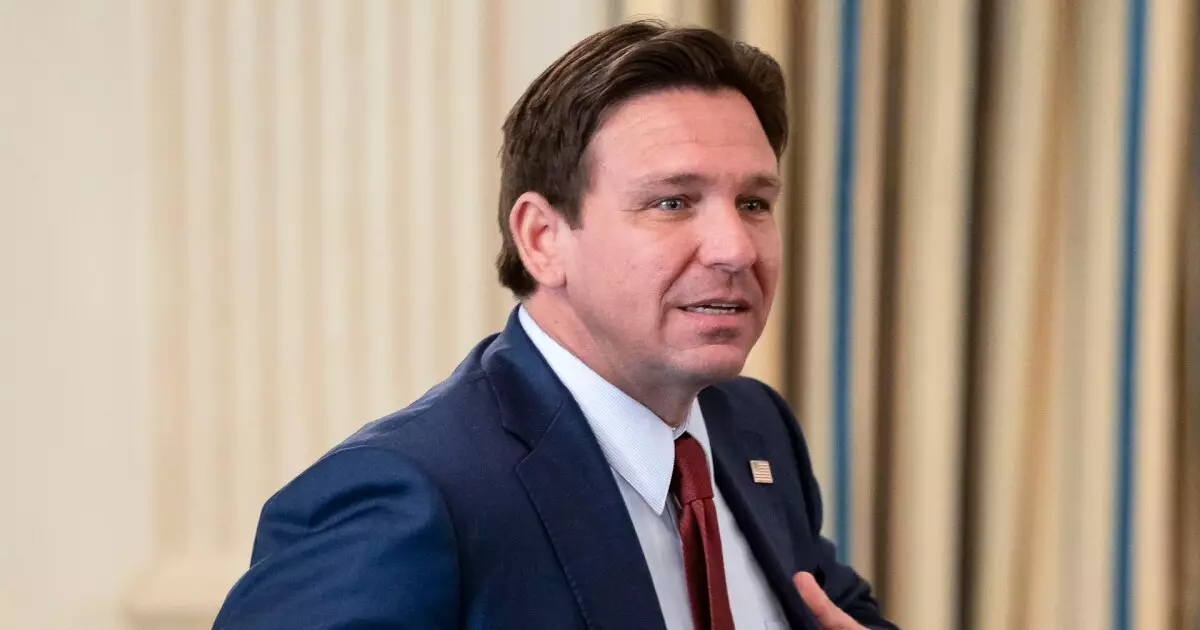In a time when fiscal prudence is more crucial than ever, Florida’s recently approved budget of $115.1 billion reflects a troubling compromise. While minimizing tax cuts and tackling state debt ought to be applauded, the underlying political maneuvers and fiscal strategies leave much to be desired. The budget has undergone a series of modifications from earlier proposals that included more ambitious tax cuts, underscoring the ongoing tussles between Florida’s Republican leadership, particularly Governor Ron DeSantis, House Speaker Daniel Perez, and Senate President Ben Albritton.
The approval of this budget appears to be less of a proactive step toward sustainable growth and more of a calculated response to political pressures. The reality is that the budget strategy seems heavily influenced by the looming specter of the 2026 gubernatorial race, particularly considering DeSantis’ plans for his wife’s candidacy. This raises significant concerns about the commitment of Florida’s lawmakers to the state’s long-term financial health versus their short-term electoral ambitions.
The Tax Cut Conundrum
The final budget agreement reflects a considerable retreat from earlier proposals, which aimed to implement sweeping tax cuts including reductions in sales tax and property tax relief. Instead, lawmakers settled for a more modest approach: the repeal of the controversial commercial rent tax and the institution of a sales tax holiday for affordable clothing. These tax cuts—costing approximately $1.07 billion annually—are all well and good, but they represent mere “easy wins” rather than bold legislative action.
Joseph Krist, publisher of Muni Credit News, aptly highlighted that these smaller tax cuts may appear wiser given the uncertainties surrounding federal funding and the approaching hurricane season. However, one cannot ignore the missed opportunity for substantive reform. Addressing Florida’s tax structure with a broader vision could invigorate the economy rather than settling for quick fixes that might assuage temporary pressures.
A Budget Based on Rhetoric, Not Reality
Critics like Sadaf Knight, CEO of the Florida Policy Institute, have pointed out the dangers of this ‘business as usual’ approach. With a projected deficit of $6.9 billion by 2027 and the possibility of losing billions in federal funding for health care and food assistance, the budget feels more like a political statement rather than a sound fiscal plan. The implications of ignoring dire economic forecasts could have devastating consequences for Florida families, yet the discourse surrounding the budget appears to ignore these critical issues altogether.
There is a glaring disconnect in the reasoning behind the new budget. Legislators seem preoccupied with political jockeying instead of confronting the financial realities facing their constituents. The emphasis on modest tax reductions within an expansive budget doesn’t inspire confidence that the state is genuinely committed to fiscal responsibility.
Debt Reduction: A Band-Aid on a Bigger Problem
Another highlight of the budget is its commitment to pay down state debt with $250 million allocated annually from the general fund towards early debt payoff and an additional one-time payment of $580 million in the coming fiscal year. While this commitment to debt reduction can be viewed positively, one has to question its effectiveness amidst broader fiscal challenges.
Focusing on early debt payment may temporarily alleviate some financial burdens, but significant issues lie ahead. Experts warn that merely reducing debt obligations isn’t a solution to the overarching problems affecting Florida’s financial health. The state’s budget, while boasting of early payoffs and a robust rainy-day fund, may rely too heavily on superficial wins rather than genuine reform.
The Future: Navigating the Waters of Economic Uncertainty
As Florida stands on the brink of potential economic turmoil—with rising deficits and shifting federal support—the state’s leaders have an urgent responsibility to reexamine their priorities. The budget’s excessive reliance on temporary tax cuts and debt reduction measures demands scrutiny and a long-term vision for sustainable economic growth.
Floridians expect their leaders to make decisions grounded in the realities of today’s economy rather than winning political points for tomorrow’s elections. As DeSantis, Perez, and Albritton navigate these challenges, their approach to fiscal stewardship will undoubtedly resonate with voters who are concerned about their financial futures.
In the turbulent waters of politics and fiscal policy, a pragmatic, forward-thinking approach is essential. Florida’s budgetary decisions today will echo for years to come; it is critical that lawmakers assess how their short-term compromises will affect the state’s longer-term economic viability. This balancing act between political ambition and financial responsibility is where true leadership will be tested.

